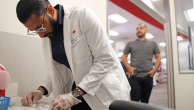Key takeaways
- A majority of U.S. parents with minor children (57%) are extremely or very confident that childhood vaccines are highly effective at preventing serious illness.
- Somewhat smaller shares are highly confident that these vaccines have gotten enough safety testing (44%) or that the vaccine schedule is safe (41%).
- Republican parents are far less likely than Democratic parents to have high confidence in childhood vaccine effectiveness (45% vs. 71%), safety testing (29% vs. 63%) and the vaccine schedule (27% vs. 58%).
- Parents with more education are generally more likely than those with less education to express high confidence in childhood vaccines. Still, about one-in-five parents with a four-year college degree and 14% of postgraduates are not too or not at all confident that childhood vaccines have gotten enough testing for safety.
- Older parents are more likely than younger parents to have high confidence in childhood vaccines’ effectiveness, safety testing and schedule.
Amid a record number of U.S. measles cases and falling childhood vaccination rates nationwide, 57% of U.S. parents with minor children have high confidence that childhood vaccines are effective at preventing illness. But trust in these vaccines – and confidence in different aspects of them – differs by parents’ demographic characteristics and party affiliation.
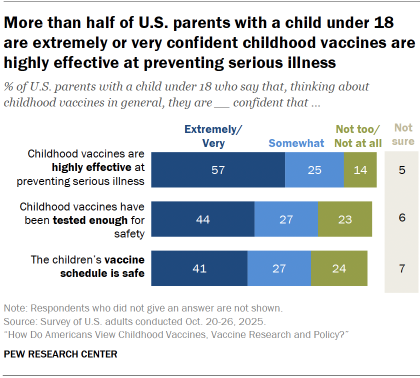
A new Pew Research Center analysis looks at parents’ confidence in three broad aspects of childhood vaccines: their effectiveness at preventing serious illness, their safety testing and the childhood vaccine schedule (that is, the timing and number of vaccines children get). This analysis is part of a broader study of Americans’ views on childhood vaccines, vaccine research and related policy.
Confidence is highest in childhood vaccine effectiveness. Nearly six-in-ten parents of minor children are extremely or very confident they help avoid serious illness, while 14% are not too or not at all confident – a difference of 43 percentage points.
But trust slips somewhat when it comes to vaccines’ safety testing and schedule. While 44% of parents are highly confident that childhood vaccines have gotten enough safety testing, about one-quarter are not too or not at all confident. A similar pattern holds for confidence in the vaccine schedule’s safety.
Are parents confident in childhood vaccine effectiveness?
While more than half of parents overall are highly confident in childhood vaccine effectiveness, Democratic and Democratic-leaning parents are far more likely to say this than Republican and Republican-leaning parents. About seven-in-ten Democratic parents are extremely or very confident in vaccines’ effectiveness at preventing serious illness, compared with 45% of Republican parents. About one-in-five Republican parents are not too or not at all confident in vaccine effectiveness.
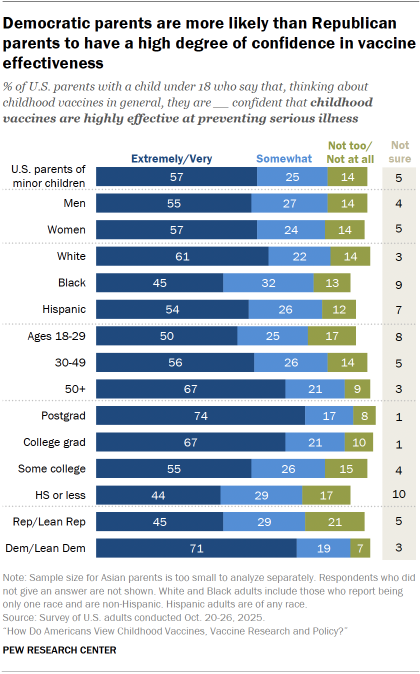
Confidence in childhood vaccine effectiveness is softer among younger parents compared with older. Half of parents ages 18 to 29 are highly confident, compared with 67% of those ages 50 and older.
Trust in childhood vaccine effectiveness is greater among parents with more education. About three-quarters of parents with a postgraduate degree are extremely or very confident in vaccine effectiveness, compared with 44% among parents with a high school education or less.
Are parents confident in childhood vaccine safety testing?
Amid calls from U.S. Health and Human Services Secretary Robert F. Kennedy Jr. to change how vaccines are tested, 44% of American parents say they’re extremely or very confident that childhood vaccines have been tested enough for safety. But there are notable differences by age, education and party.
Older parents are more trusting of safety testing. Roughly six-in-ten parents ages 50 and older have high levels of confidence in vaccine safety testing, compared with 33% of parents ages 18 to 29.
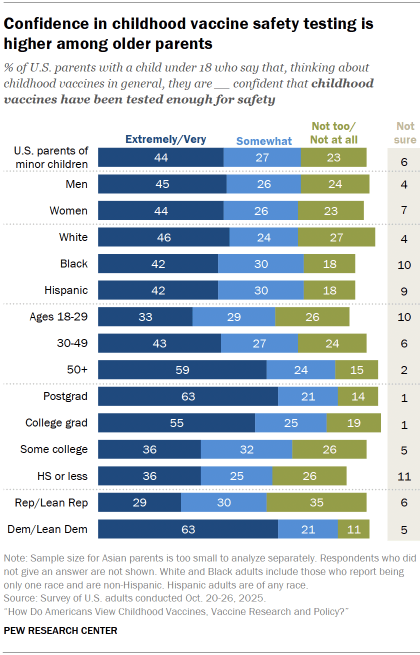
Larger shares of parents with a postgraduate education are highly confident in childhood vaccines’ safety testing, compared with those who have less education. But skepticism about safety testing isn’t limited to parents with lower levels of education. About one-in-five parents with a four-year college degree and 14% of those with a postgraduate degree are not too or not at all confident that childhood vaccines have been tested enough for safety.
The starkest difference in confidence is along party lines. Democratic parents are more likely than their Republican counterparts to have high confidence in the safety testing, by a margin of more than 30 percentage points.
Are parents confident in the childhood vaccine schedule?
At a time when the childhood vaccine schedule – that is, the number and timing of these vaccines – has been a topic of federal health policy discussion, 41% of parents are highly confident that the vaccine schedule is safe. But about one-quarter are not too or not at all confident in its safety.
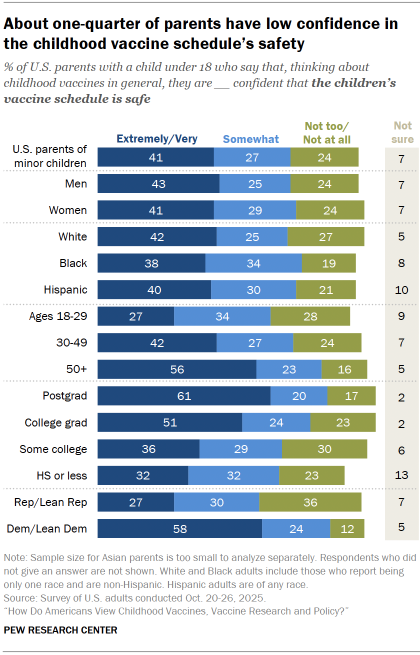
Older parents are more likely than younger ones to have high confidence in the vaccine schedule’s safety. More than half of parents ages 50 and older (56%) are confident that it is safe, compared with 27% among those ages 18 to 29.A roughly equal share of younger parents (28%) have low confidence in the schedule.
Parents with more education are more likely than those with less education to be confident in the vaccine schedule. But notable shares of parents with higher levels of education are not too or not at all confident in its safety, including 20% of those with a four-year college degree or more.
Low confidence in the vaccine schedule is particularly pronounced among Republican parents. Among these parents, more have low confidence (36%) than high confidence (27%) in its safety. By contrast, 58% of Democratic parents have high confidence and 12% have low confidence.



